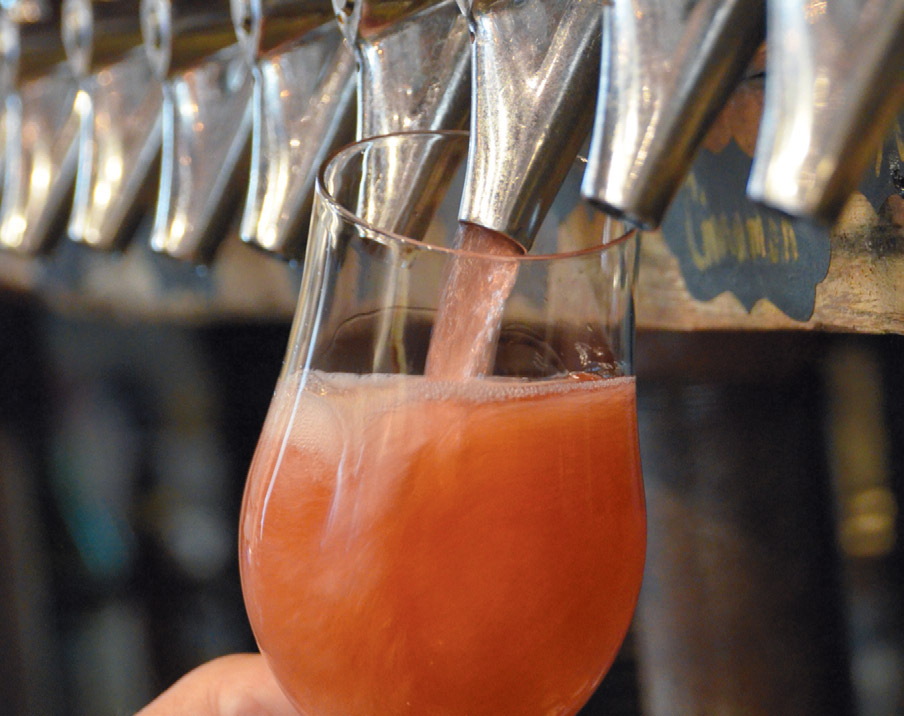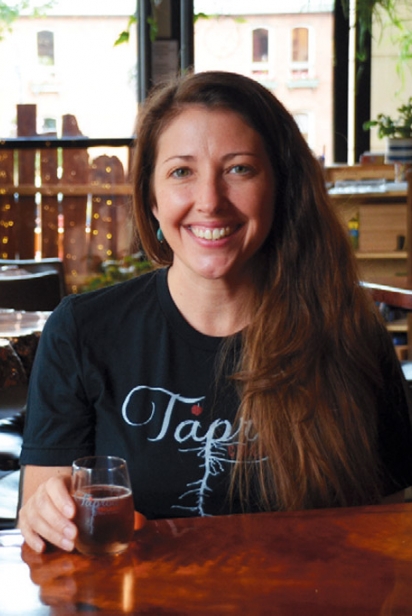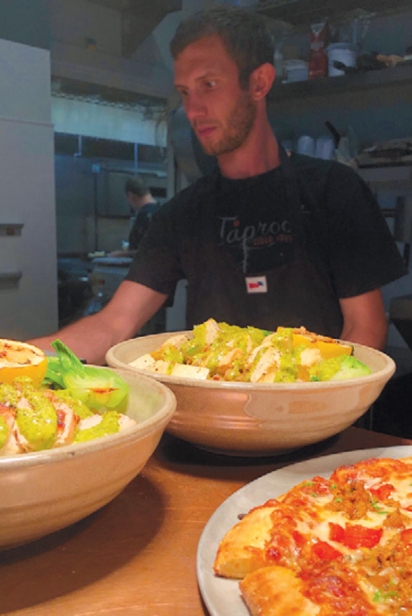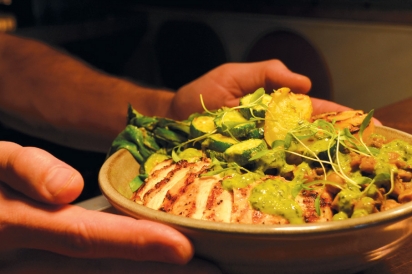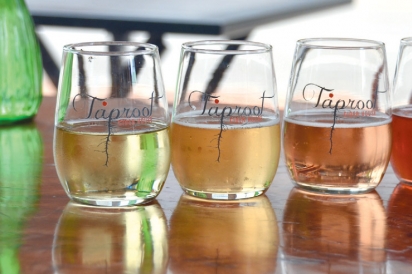Rooted in Community: Taproot Cider House
Imagine a tree. The taproot is the first root to sprout, becoming the foundation. The roots that branch off are the employees and the extended family. The trunk and its ever-expanding rings are the farmers holding up the tree. The branches and leaves are the customers. The ripe fruit is for all to enjoy.
So Jennifer Viren describes Taproot Cider House, the cider bar and restaurant that she created on the corner of Front Street and Park in downtown Traverse City, a site she chose for the large windows looking out onto the city and the bay beyond, just east of the central hub of the city, in view of the State Theatre. The history of this corner (once the site of an outdoor market) made it the perfect location. As a first for Traverse City, and, says Jen, also for the nation, Taproot is setting the standards for what it is to be a cider bar.
“How did I get here? I think about that question every day. I’ve always been a lover of a healthy environment. I’ve always loved getting my hands in the dirt. I believe in sustainable living, attending farm conferences, farm-to-school conferences, promoting healthy living. I built volunteer garden beds, including one for The Cooks’ House in their old location.”
Majoring at university in marketing and sales, Jen filled her schedule with a wide variety of classes. She had the goal to combine her love of farming with organic manufacturing. After college she started a company called Happy Sprouts, to bring organic goods from Manistee and Benzie farms to market in Traverse City.
From 2009 to 2015 she worked with Dennis Mackey of Northern Natural Organics, helping establish two tasting rooms, working on branding and, along the way, imbibing his philosophy of “true to the fruit.”
All the while her own business plan was germinating: a place where she could live her beliefs and expand into the community. A place where organic, local, sustainable and nourishing would be the order of the day, and where art and music would flourish. SCORE in Traverse City, with its cadre of small-business professionals, helped her fine-tune her plan.
Taproot Cider House was conceived as an outlet to reach out to small farmers and small businesses, adhering to organic principles, working seasonally with the web of connections Jen had already built, taking it to the next level, touching more people than farming her own acre of soil might accomplish. Creating Taproot “was a way for me to see and know that I am impacting our community. I don’t need to shout that we are local, GMO-free and organic where possible. Some people don’t care about that. But I’ve learned that I can do my best and people leave healthier. I just know it.”
Growing up surrounded by a largely agricultural community, Jen witnessed the departure of many farmers of the last generation. She observed how the government regulations to become certified organic were cumbersome and expensive, whereas the rules encouraged working with chemicals. “I felt it was my mission to prove that you could strive for better, that it was important to the overall health of our community.”
With a stage for local music—live music rotation every Saturday by a local musician, Wednesdays Open Mic and regular acts on Thursday and Friday nights—walls with art by local artists, a menu of ciders representing more than a dozen local producers, as well as three of Jen’s own ciders—currently produced for her by Northern Naturals—there is much to bring a person into this spacious restaurant. Ceiling fixtures feature lights draped through ancient apple tree taproots. Old barnwood adorns the walls. Tables are custom-built from slabs of white and red pine felled by the storms of 2013 and 2015 transformed by metal sculptor Alex Brydges of Fly Ash Forge and carpenter Chad Smith of Artisan Construction.
Jen sees these design choices as nonverbal communication. Those apple tree taproots on the ceiling connect you to the orchard. The rough-hewn barnwood comes from a former dairy farm in Ludington. The wheels come from a production line of a nearby farm. The weathered wooden ladders on the ceiling and wall were donated, or purchased from an Old Mission Peninsula cherry farm. Local artists sculpted the bar’s cider and beer tap handles.
If the scenery connects you to the farm, the drinks menu connects to wild and cultivated herbs and fruit. “I’ve always been into wild harvesting, growing herbs and making my own medicine. For years I’ve been infusing herbs into liquor at home, and wondering, ‘What is this rosemary going to taste best with?’ The answers come naturally to me, blending flavors, coming up with combinations.” Though she enjoys many aspects of the business, it is behind the bar that Jen feels her gifts are best expressed, where she can play and create and let her imagination run wild.
A prime example is the Eldermule, her personal take on the popular Moscow Mule. It features elderberry-infused vodka, local ginger beer, lemon peel and raw honey. Along with her elderberry vodka, Jen uses a range of personally crafted infusions for her cocktails: tea vodka, lemongrass vodka, cilantro tequila, ginger gin and apple ginger gin.
From the first day, the food menu showcased local produce, incorporating the seasonal variations into house-made pizzas, sandwiches and more. However, the arrival of Chef Andrew Viren to the restaurant in 2017 and into Jen’s life (now married, they are raising three children together) has invigorated the menu with his international experience, culinary gifts and big-city flare (he is originally from Chicago).
Andy, coffee in hand, joins the conversation before the kitchen calls him back. “I used to live in England. When I think of a cider house, I think community and—in England—influences from the Middle East, incorporating apples into any and everything. In my mind, I take what Jen and our family like to eat and add a little bit of flare, global influences, showcasing what our local farmers bring to us. Globally—tomatoes, zucchini, potatoes— they’re pretty consistent in any cuisine. How do I make them more exciting? That’s what’s pushing me. Taking common things and making them exciting for people— fresh and plating wise, rustic and contemporary, cast iron on top of applewood boards—bringing it all together.”
As he ducks back behind the swinging door, Jen speaks of her husband and head chef ’s skills and creativity, “He has helped me branch out and find more local produce. He connects with the local farmers. He’s almost like a scientist. He’ll get an idea in his head and then he’s sitting in the middle of all of our books, combining flavor profiles and bringing things to the table, doing things no other chef I’ve known has done, making it better than you’ve ever had, even if it’s just mashed potatoes. His Buffalo cauliflower wings, this vegan dish, he makes his own hot sauce from scratch. And it’s just really beautiful, the quality and consistency match what he’s presenting.”
Together they offer a series of cider dinners from November through May, pairing menus to ciders, exploring flavor combinations and profiles. “We’ve had two couples who’ve been to every one. They’re coming back because they love how he can pick out the flavor notes [in the ciders] and find food that pairs with it.”
This summer’s best-selling dish was Chef Andrew’s take on a Yogi Bowl: “I’d been resistant but then I tried it and my mind was blown,” Jen says, “Organic, vegan, gluten free, where you’re able to add the protein of your choice: organic tofu, local organic hanger steak, or organic chicken. And the flavors in there. They, he, just blow my mind. It’s my favorite dish right now.”
For the record, the Yogi Bowl is composed of organic brown rice, chickpeas, seasonal market-fresh vegetables, sumac salt, house green shawarma sauce and grilled lemon, with a choice of the three proteins.
Taproot has grown in each of its three years, tapping into a movement while helping to create it. Jen herself, committed to the sustainable, has learned that what she might do as an individual pales compared to what can be accomplished by a community. Seven of her original hires are still with her, and at full summer strength she employs 44 people. At a time when many in the hospitality industry have had a hard time finding sufficient help, she had no problem staffing this year, and says that when one employee departs—perhaps to travel in Italy and return inspired—another employee usually finds her the next hire.
“I may come in every day knowing I have the final say, but, I follow the mantra: ‘to lead people, walk behind them.’ I don’t like to micromanage. You might miss things that others see.” She quotes local band Breathe Owl Breathe: “See things that otherwise I might just pass by.” Other phrases pepper her speech: “You’re not working unless you’re working on yourself.” “Everyone brings something to the table.” “It’s a partnership of everybody that works here. We all work together.”
The sun is streaming in, reflecting onto Jen’s animated face, bouncing off the high-gloss surface of the polished pine slab table, Petoskey stones collected forever in the resin-filled crevasse of the slab. Young, dynamic, committed, mother to small children (her youngest is just 1), business owner and invested citizen of Traverse City and the local farming community. What comes next?
Perhaps a small farm of her own and a production facility to make her cider? “I’ve been trying to figure it all out. I grow cut flowers and edible flowers for Taproot, and would like to do so on a larger scale. But the longer we’ve been open, the more I realize it’s all readily available to us from our local farmers. My higher self is supporting our community. To be able to just have someone deliver boxes of produce and proteins each week. . . Sustainability is a community project. It’s a reminder of why I am doing this.”
And yet, producing her own small-batch cider in her own production facility is still part of the dream. Perhaps near where she grew up over by Long Lake? If that perfect piece of land with water on it appears. . . But with loans and more to manage, land acquisition is not in the immediate future. Though she already knows she would purchase apples from the local orchardists she knows and respects, and still plant a few trees of her own.
IF YOU GO: Taproot Cider House
300 E. Front St., Traverse City
231-943-2500 • TaprootTC.com


